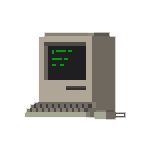re: inventing on principle
So what's really impressive about this is actually not any technical feat but his observations and ingenuity.
When he points out: "creators need a direct connection to what they're making" (versus "working blind")
It's one of those things we hardly notice in our day-to-day because we take the status quo for granted. Just look around and see how much shit is broken in this regard.
To be on the right side of his principle, there are two parts: the immediate feedback and the direct input.
- Feedback. When working blind, it's so much harder to discover things... it's almost impossible to stumble into things by accident. Look at the way he tweaks a couple parameters and discovers a new game concept game based on gravity. These ideas are all over the place and the rate at which you discover them is directly proportional to the rate at which you can experiment.
- Direct input. You should be able to make things as fast as you can think them. In his example he uses his hand for animating and the result is 10x faster. It's effective because that's what you wish you could use in the first place; clicking around buttons with your mouse and adjusting some keyframes is an indirect way to achieve what the hand does best: precise motion.
So here's a question: What if musical composition programs were redesigned with this in mind? You could use your own voice as an input to musical composition, using it to put in a sequence of relative pitches and control timing.
After all, the voice is the most "native" instrument to us.
